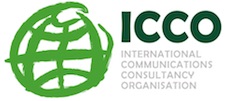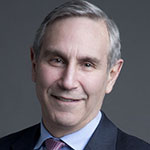ICCO, 2,500 PR firms in 55 countries, voted the “Helsinki Declaration,” a pompous document urging ethical behavior of members. Ignored is the rude, unhelpful and not available behavior of many PR people.
 |
Charlene Corrin is press contact of the Int’l Communications Consultancy Organization, London. Francis Ingham, general manager of the PR Consultants Assn., London, is also CEO of ICCO.
Neither are responding to our queries at this time.
Press relations on the corporate side have also reached an all-time low.
Appropriate terms for this PR behavior are “wrong,” “bad,” and even “naughty.” There is no need to bring out the heavy gun of “ethics violation.” That invites endless discussion. It’s wrong for PRSA to have one national conference in New York in 25 years.
|
|
The “war” that President Donald Trump is waging against the press is mirrored in many parts of the business and association worlds. Patrick Jackson, who in 1980 was elected president of the PR Society of America, the world’s largest PR group with 21,000 members, said the Society’s press policy would be “duck ‘em, screw ‘em and go direct.”
The Society has held to this policy to this day. Its national conference in Boston Oct. 7-11 had no press room, and its online press room only gave awards to members. There wasn’t a word about the fractious proposal to replace “PR” with “communications” throughout the bylaws. There still isn’t to this day. The Boston Globe and Boston Herald did not cover the event—obviously not invited.
This writer, as usual, was banned from covering the Assembly and all sessions and from entering the exhibit hall where 45 service firms exhibit, some of them our advertisers and all of them ad prospects.
ICCO Unveils Ten Principles
|
|
ICCO, whose CEO is Francis Ingham, voted ten ethical principles at its meeting in Helsinki, including: follow applicable laws, observe the highest professional standards, respect the truth, uphold the reputation of the industry, deal honestly with the media, don’t circulate fake news, and use social media responsibly.
Fine general advice but how about “Pick up the phone when a reporter calls,” and “Don’t wait for them to call but call them.”
Ingham, who is director general of the 21,000-member PR Consultants Assn., London, is a firm believer in the need for PR people to deal with the press.
PR needs “advocates who can communicate with the media and general public,” he said in September.
Ingham spoke after the UK-based PRCA expelled Bell Pottinger, which had been accused of running a campaign that “inflamed racial discord” in South Africa.
The firm went into "administration" (similar to bankruptcy) after client defections, the resignation of CEO James Henderson, five-year expulsion from the PRCA, and failure of consultant BDO to find a buyer.
PRSA, Other Groups Called on to Act
Ingham aimed his message of PR’s duty to “engage with the public” specifically at “anybody representing our business” which would include PR Society of America, Int’l Assn. of Business Communicators, PR Council and other trade groups.
PRSA abandoned its enforceable Ethics Code in 1999 and has seen its membership total stagnate since then. Enrollment of 19,600 in 2000 grew to only 21,000 in 2017. Revenues in 2016 of $11.3M were below revenues of $11.4M in 2006.
Modern PR is much more than traditional media relations but “an antagonistic relationship with traditional media means our story seldom breaks through to the business community or general public,” added Ingham, ten years as director general.
PRCA’s suspension of BP shows that members “will be held to account by its ethical code,” said Ingham.
Provable Ethics Violations Rare
Provable PR firm ethics violations are about as rare as a solar eclipse. The number of prosecuted cases in the last 50 years can be counted on the fingers of one hand. PR firms quit the governing ethics body or avoid obviously bad accounts.
A horrible case is Summer Harrison in 1988—hit with two violations for asking PRSA to investigate four high PR execs giving advice to CIA head William Casey on raising funds for the Contras, including Jim Bowling and Elias Buchwald of B-M. Harold Burson refused to go.
That link shows how PRSA treasurer Lee Duffey's PR firm should have been the subject of an Ethics Board inquiry in 1999 but he hired L. Lin Wood who frightened PRSA so much it ditched the entire code.
Wood is profiled as the “Attorney for the Damned” by Wiki.
Wood ordered me not to write anything about the Duffey firm without clearing it with him. I continued writing. PRSA caved and ditched the entire enforceable code.
Ted Pincus, Financial Relations Board, not active in PRSA, got smacked because his firm sent false releases for a client.
The outcome of Ethics cases, including failure to investigate public cases involving Duffey and Joe Epley, show PR people can’t police themselves. PRSA’s Ethics Board should again have an enforceable Code and should be dominated by non-members.
Rude, Hidden PR People a Press Problem
The problem with PR is PR people who don’t return phone calls, who display no contact points and who don’t call on reporters, which was standard in the 60s and 70s. The congloms changed that. Jackson, 1980 PRSA president who avoided the press, was a harbinger of Trump, whose popularity is at an all-time low—43% says, Fox.
Talk of “ethics” is a smokescreen. It’s false PR in that those who talk endlessly about it think they are sending the message that they are ethical. Their staff may be rude and unhelpful to the press, but that is not “unethical.”
PR people need training in good olde etiquette. Talk about ethics coats the speakers in veneer of goodness. The term "PR" has vanished from many corporations and assns.
PRSA Harsh Legally to Members and Press
Thirteen pages of harsh legalisms that apply to members who use the PRSA website were blasted to them in 2012. The words “sole discretion” appear five times and violators are threatened with “criminal and/or civil prosecution.”
One section says: “We may suspend any account where violations of these Terms of Use and Usage Policies are suspected.” Says the next sentence: “We also reserve the right to disable your user account at our sole discretion without explanation.”
Any searches by members become “PRSA’s own records” and may be intercepted and reviewed “at any time,” the document warns. The system collects “cookies” that identify users.
Furthermore, by agreeing to the Terms of Usage, members are letting PRS sell their names and addresses for “one-time mailing use only” by “responsible third parties.” Members can opt out of this if they find out about this by wading through 13 pages of dense legalisms.
Lawyers for Venable, the Society's 500-lawyer firm in D.C., have told us the Society is under no legal obligation to deal with us at all. PRSA has spent nearly $800K on law firms in the past tens years and nothing on outside PR counsel based on available records.
Lawyers Rule
There’s no doubt that much of the communications blockage is coming from lawyers who are increasingly dominant in U.S. life. The U.S. has 1.22 million lawyers—391 per 100K of citizens. Japan has 23 per 100K and Canada 26 per 100K. U.S. lawyers file 15M lawsuits yearly. “The U.S. is choking on litigation,” wrote the Boston Globe’s Jeff Jacoby May 9, 2014.
Communications with editors, incoming and outgoing, are supervised by corporate lawyers.
CEOs need to step in and tell the lawyers to loosen their grip on PR.
The Anti-Lawyer Party claims there is an “International conspiracy of lawyers to destroy the U.S. from within.”

 Charlene Corrin
Charlene Corrin Francis Ingham
Francis Ingham
 Helga Ying, who is in charge of International AIDS Society’s offices in San Francisco and Oakland, is moving to Edelman as global and US chair of Purpose.
Helga Ying, who is in charge of International AIDS Society’s offices in San Francisco and Oakland, is moving to Edelman as global and US chair of Purpose.  Emmanuel Tchividijian, who was senior VP/chief ethics officer at Ruder Finn in a 20-year stint, has established
Emmanuel Tchividijian, who was senior VP/chief ethics officer at Ruder Finn in a 20-year stint, has established  Every profession needs codes of conduct to help ensure the credible performance of its members. The public relations profession has several codes aimed at building and sustaining positive behavior but none of them addresses how practitioners must write for PR and related business purposes. (3 reader comments)
Every profession needs codes of conduct to help ensure the credible performance of its members. The public relations profession has several codes aimed at building and sustaining positive behavior but none of them addresses how practitioners must write for PR and related business purposes. (3 reader comments) Workplace diversity Issues, ranging from race to gender, have long been high profile threats to the brand. Ageism has been the exception - until now. (2 reader comments)
Workplace diversity Issues, ranging from race to gender, have long been high profile threats to the brand. Ageism has been the exception - until now. (2 reader comments) There's a battle for truth, in which people no longer share common facts and are unable to have a rational debate, Richard Edelman said during his speech at USC Annenberg School of Communication and Journalism on April 12. (1 reader comment)
There's a battle for truth, in which people no longer share common facts and are unable to have a rational debate, Richard Edelman said during his speech at USC Annenberg School of Communication and Journalism on April 12. (1 reader comment)


 Have a comment? Send it to
Have a comment? Send it to 
No comments have been submitted for this story yet.